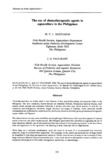The use of chemotherapeutic agents in aquaculture in the Philippines
- Global styles
- MLA
- Vancouver
- Elsevier - Harvard
- APA
- Help
Share
抄録
Chemotherapeutants are widely used to treat diseases of fish, specifically shrimp and aquarium fishes in the Philippines. The most commonly treated diseases are luminous vibriosis, filamentous bacterial disease, shell disease, larval mycosis and protozoan infections in shrimp and white spot, velvet disease, fin and tail rot, crustacean and monogenean infections, fungal infections and dropsy in finfishes. These chemicals include chloramphenicol, erythromycin, oxytetracycline, nitrofurans, formalin, malachite green, potassium permanganate, copper sulfate and Neguvon. The indiscriminate use may cause mortalities and morphological deformities in the host, development of resistant strains of bacteria and public health hazards. The Philippine government has embarked on regulating the use of these chemicals. Initially, use of chloramphenicol has been banned in food producing animals. In the near future, rules and regulations on the registration and labelling of these chemicals will be implemented. While these are a welcome development, much still needs to be done. It is recommended that medically important drugs be excluded from aquaculture. The campaign on the careful and restricted use of drugs should be intensified in both drug and aquaculture industries. Further research must be done on the screening of other drugs which are effective and environmentally safe. Lastly, funds should be allocated for research, extension and manpower development in fish health management, specifically, in chemotherapy.
Suggested Citation
Baticados, M. C. L., & Paclibare, J. O. (1992). The use of chemotherapeutic agents in aquaculture in the Philippines. In M. Shariff, R. P. Subasinghe, & J. R. Arthur (Eds.), Diseases in Asian Aquaculture, I: proceedings of the first Symposium on Diseases in Asian Aquaculture : 26-29 November 1990, Bali, Indonesia (pp. 531-546). Makati, Metro Manila, Philippines: Fish Health Section, Asian Fisheries Society.
Type
Conference paperCollections
- Conference Proceedings [300]


